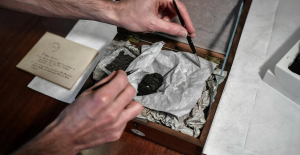In China, an epidemic of childhood pneumonia seems linked to contamination by Mycoplasma pneumoniae, a bacteria well known to infectious disease specialists. Is France in turn at risk of being affected by a similar epidemic wave? In any case, the bacteria is already circulating in the territory, because specialists are already noticing an increase in cases of “atypical pneumonia”. An unusual increase in emergency room visits, particularly among young people, is raising fears of an “epidemic outbreak”.
“Since April there has been an increase in the circulation of Mycoplasma pneumoniae around the world, particularly in Asia but also in Europe. Whether in the city or in rural areas, we are indeed recording an increase in the number of hospitalizations in France,” confirms Dr Alexandre Bleibtreu, member of the French-language Society of Infectious Pathology (SPILF). . Last week alone, 2,150 visits to the emergency room for pneumonia were recorded by SOS Médecins for children under 15 years old. For ten years, this figure has never been reached for this type of pulmonary infection.
» READ ALSO - Pneumonia is very dangerous for older people
If adults are also affected, 30% of cases of pneumonia induced by Mycoplasma pneumoniae occur in very young people. Up to 50% for the 5 to 15 year old age group. Transmission occurs by droplets or direct contact with an infected person. “Fever, fatigue, runny nose and dry cough are the first symptoms. This can progress to respiratory distress after a few weeks, which signals the onset of atypical pneumonia or atypical pneumonia as opposed to pneumococcal pneumonia,” describes Dr. Gilles Pialoux, head of the infectious and tropical diseases department at the Tenon hospital in Paris.
In the most serious cases, mycoplasma infection progresses outside the lungs in cutaneous or even neurological forms. However, don't panic. “It is too early to talk about an epidemic,” reassures Gilles Pialoux. “We are not in a situation similar to Covid. It’s simply the re-emergence of a known pathogen,” adds Dr Bleibtreu.
» READ ALSO - Epidemic of childhood pneumonia in China: what do we know
The Mycoplasma pneumoniae bacteria circulates regularly in France but in a minority compared to other pulmonary infections such as influenza or bronchiolitis. “Typically, this pathogen becomes epidemic every 5 to 7 years. The last major epidemic in Europe took place in 2019. It mainly affected northern countries, sparing France,” explains Alexandre Bleibtreu. During the Covid-19 pandemic, the infectious agent had also kept a low profile. But, unlike other respiratory pathogens, it did not reappear in force after the end of confinement.
How then can we explain its abnormal presence throughout the territory? “At the moment no one knows,” admits Dr. Pialoux. Since the bacteria has not circulated epidemically for ten years, it is very likely that human immunity to this pathogen has declined. “We are facing a population that has not had an immune response for ages and is therefore poorly equipped to defend itself,” insists the doctor. Added to this is an apparent relaxation of the French on barrier gestures. However, underlines Dr Bleibtreu, it is possible that a new variant of this bacteria could spread across the territory. There is no information to confirm this at the moment and this hypothesis remains “very unlikely”.
» READ ALSO - Concerns about the progression of certain antibiotic resistances in France
The other question that bothers infectious disease specialists concerns the risks of bacterial resistance. Usually, pneumonia is treated using a family of antibiotics, macrolides. “But we have no information on the rate of antibiotic resistance. We were at 10% a few years ago but we currently do not have enough information to measure it due to the lack of circulation of the bacteria,” indicates Gilles Pialoux.
French health authorities therefore remain on guard. A surveillance system is currently deployed throughout the country to identify new cases and determine the extent of the spread. If the increase in pneumonia were to be confirmed and persist, the authorities could be required to sound the alert. But we are not there yet. Barrier gestures and wearing a mask remain strongly recommended to avoid getting sick.

 B:SM will break its investment record this year with 62 million euros
B:SM will break its investment record this year with 62 million euros War in Ukraine: when kyiv attacks Russia with inflatable balloons loaded with explosives
War in Ukraine: when kyiv attacks Russia with inflatable balloons loaded with explosives United States: divided on the question of presidential immunity, the Supreme Court offers respite to Trump
United States: divided on the question of presidential immunity, the Supreme Court offers respite to Trump Maurizio Molinari: “the Scurati affair, a European injury”
Maurizio Molinari: “the Scurati affair, a European injury” Irritable bowel syndrome: the effectiveness of low-carbohydrate diets is confirmed
Irritable bowel syndrome: the effectiveness of low-carbohydrate diets is confirmed Beware of the three main sources of poisoning in children
Beware of the three main sources of poisoning in children First three cases of “native” cholera confirmed in Mayotte
First three cases of “native” cholera confirmed in Mayotte Meningitis: compulsory vaccination for babies will be extended in 2025
Meningitis: compulsory vaccination for babies will be extended in 2025 When traveling abroad, money is a source of stress for seven out of ten French people
When traveling abroad, money is a source of stress for seven out of ten French people Elon Musk arrives in China to negotiate data transfer and deployment of Tesla autopilot
Elon Musk arrives in China to negotiate data transfer and deployment of Tesla autopilot Patrick Pouyanné, CEO of TotalEnergies, is very reserved about the rapid growth of green hydrogen
Patrick Pouyanné, CEO of TotalEnergies, is very reserved about the rapid growth of green hydrogen In the United States, a Boeing 767 loses its emergency slide shortly after takeoff
In the United States, a Boeing 767 loses its emergency slide shortly after takeoff A charred papyrus from Herculaneum reveals its secrets about Plato
A charred papyrus from Herculaneum reveals its secrets about Plato The watch of the richest passenger on the Titanic sold for 1.175 million pounds at auction
The watch of the richest passenger on the Titanic sold for 1.175 million pounds at auction Youn Sun Nah: jazz with nuance and delicacy
Youn Sun Nah: jazz with nuance and delicacy Paris Globe, a new international theater festival
Paris Globe, a new international theater festival Skoda Kodiaq 2024: a 'beast' plug-in hybrid SUV
Skoda Kodiaq 2024: a 'beast' plug-in hybrid SUV Tesla launches a new Model Y with 600 km of autonomy at a "more accessible price"
Tesla launches a new Model Y with 600 km of autonomy at a "more accessible price" The 10 best-selling cars in March 2024 in Spain: sales fall due to Easter
The 10 best-selling cars in March 2024 in Spain: sales fall due to Easter A private jet company buys more than 100 flying cars
A private jet company buys more than 100 flying cars This is how housing prices have changed in Spain in the last decade
This is how housing prices have changed in Spain in the last decade The home mortgage firm drops 10% in January and interest soars to 3.46%
The home mortgage firm drops 10% in January and interest soars to 3.46% The jewel of the Rocío de Nagüeles urbanization: a dream villa in Marbella
The jewel of the Rocío de Nagüeles urbanization: a dream villa in Marbella Rental prices grow by 7.3% in February: where does it go up and where does it go down?
Rental prices grow by 7.3% in February: where does it go up and where does it go down? Even on a mission for NATO, the Charles-de-Gaulle remains under French control, Lecornu responds to Mélenchon
Even on a mission for NATO, the Charles-de-Gaulle remains under French control, Lecornu responds to Mélenchon “Deadly Europe”, “economic decline”, immigration… What to remember from Emmanuel Macron’s speech at the Sorbonne
“Deadly Europe”, “economic decline”, immigration… What to remember from Emmanuel Macron’s speech at the Sorbonne Sale of Biogaran: The Republicans write to Emmanuel Macron
Sale of Biogaran: The Republicans write to Emmanuel Macron Europeans: “All those who claim that we don’t need Europe are liars”, criticizes Bayrou
Europeans: “All those who claim that we don’t need Europe are liars”, criticizes Bayrou These French cities that will boycott the World Cup in Qatar
These French cities that will boycott the World Cup in Qatar MLS: new double for Messi who offers victory to Miami
MLS: new double for Messi who offers victory to Miami PSG-Le Havre: Ramos on his way, Kolo Muani at the bottom of the hole… Favorites and scratches
PSG-Le Havre: Ramos on his way, Kolo Muani at the bottom of the hole… Favorites and scratches Football: Vasco da Gama separates from its Argentinian coach Ramon Diaz
Football: Vasco da Gama separates from its Argentinian coach Ramon Diaz F1: for the French, Ayrton Senna is the 2nd best driver in history ahead of Prost
F1: for the French, Ayrton Senna is the 2nd best driver in history ahead of Prost

















